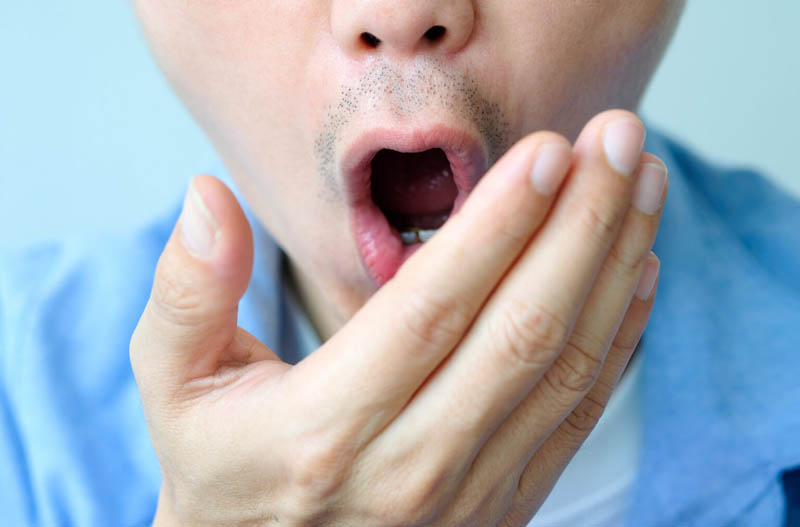14682 Pennock Avenue, Apple Valley, MN 55124
What Causes Bad Breath?

Bad breath, or halitosis, can impact your confidence and interpersonal relationships. As a pervasive problem affecting people of all ages, you should not be ashamed of your breath. But you’ll want to get to the root causes and find effective practices to combat them so you can feel more confident out and about in the world!
Schedule a dental appointment!
What Causes Bad Breath?
Bad breath, or halitosis, is an unmistakable, unpleasant odor emitted when one speaks or breathes out of the mouth. It emerges due to foul-smelling gasses produced by bacteria that thrive in the oral cavity.
The root causes of bad breath are diverse, including:
- Irregular dental care, such as brushing and flossing
- Consumption of foods with strong odors (i.e., garlic and onions)
- Gum disease or periodontitis
- Dry mouth due to lack of saliva production
- GERD or acid reflux
- Infections and diseases of the sinuses, lungs, liver, kidneys, or pancreas
- Infrequent eating due to dieting
- Use of tobacco products, alcohol, and coffee
- Untreated tooth decay
How to Get Rid of Bad Breath
The good news is that there are a few things you can do to alleviate bad breath:
- Make healthful food choices. Eating plenty of fresh fruits and veggies can help decrease bad breath. Some people swear that pineapple juice or slices make a difference! You’ll also want to watch how often you opt for sugary snacks and drinks and choose them in moderation. Here’s a lot of drinks to limit for a healthy mouth.
- Drink plenty of water. Keeping yourself hydrated is one of the best ways to decrease bacteria in the mouth. If your mouth is dry, it can affect saliva, which helps clean the mouth and eliminate smelly bacteria!
- Maintain regular dental care habits. Brush at least twice a day and floss every day at least once. Daily oral care helps prevent the accumulation of bacteria on rotting food particles, contributing to bad breath.
To Read: Should I Brush My Teeth Before or After Breakfast?
- Schedule regular appointments and cleanings. Make appointments with medical professionals, including your family doctor and dentist, to ensure your health is in order. Because tooth decay is a common reason for bad breath, you want to deal with dental issues immediately instead of letting them worsen.
If you’ve tried these tactics and not seeing a noticeable difference, it might be a chronic problem. In that case, it’s time to call in the professionals. Contact the Dakota Dental Apple Valley dentists to discuss the ideal treatment options for you.
Why My Mouth Smells Bad Even After Brushing
If you have bad breath even after brushing your teeth, something more significant might be at play.
- Not including your tongue when brushing your teeth means bacteria still live in your mouth. Make sure to give it a nice clean during your daily oral care routine. You can use your toothbrush or a tongue scraper to get the job done.
To Read: How to Scrape Your Tongue (According to the Experts)
- Cavities give bacteria a place to live, and it’s not so easy to get the bacteria out with simple brushing and flossing. A deep cleaning dental appointment can help get bacteria out there.
- If you have gum disease, bacteria might also be hiding in gum pockets where it’s hard to get it out. Again, brushing and flushing won’t make much difference—you’ll need to schedule a dental appointment.
- Drugs, alcohol, and tobacco use can contribute to dry mouth, which, as we’ve discussed, can lead to bad breath. In particular, tobacco is notorious for leaving behind an odor even after you brush your teeth.
Combat Bad Breath With Dakota Dental
If you’ve been suffering from bad breath and nothing seems to work, schedule an appointment at our Apple Valley dental clinic. Don’t be embarrassed—we’ve seen it all before.
We proudly serve the southern Minneapolis and Saint Paul suburbs, offering comprehensive dental services for adults and kids. Our dental services include:
- general dental services, including dental fillings
- cosmetic dentistry
- dental implants
- and more

